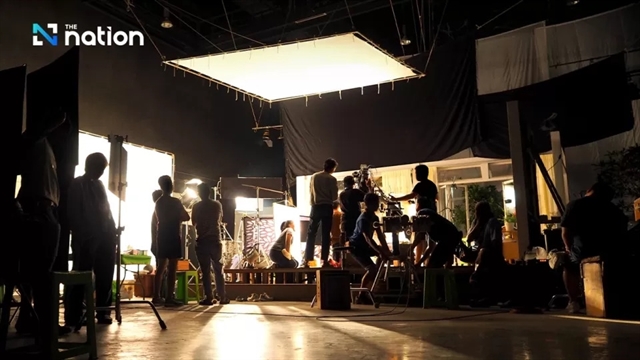 Life & Style
Life & Style

AI will shorten the production time, which means the production team will have more time to produce more movies and hire more people, says director Norman Chan from the Hong Kong Academy of Film Association.

|
| Director Norman Chan from the Hong Kong Academy of Film Association says AI still needs a more human touch. The Nation Photo |
BANGKOK – Filmart, Asia’s largest entertainment expo that concluded in Hong Kong on March 11-14, saw industry experts focus on virtual production methods and their impacts.
The Nation spoke to key players in Hong Kong‘s AI and virtual production – director Norman Chan from the Academy of Film Association, Hong Kong Baptist University (HKBU); Lam Wai Keung, deputy head of the Department of Digital Media Hong Kong Design Institute; and co-founder and CEO of Votion Studio, Roger Proeis – on how they see these controversial adoptions evolve.
Chan believes that AI can create the first and second drafts of a script and it can replace the junior scriptwriter. However, the senior scriptwriter would still be needed to recheck the script.
The famous Hong Kong film director Wong Kar-wai spent two to five years writing the script for two of his acclaimed movies, namely Fallen Angel (1995) and In the Mood for Love (2000), says Chan. With the use of AI, Chan believes it could have been finished in a matter of months.
“In the long run, I don’t think it will lead to job losses as AI will leverage the film industry and shorten the production time, which means the production team will have more time to produce more movies and hire more people,” says Chan.
Chan reveals that his students at the Hong Kong Baptist University are now able to perform alongside well-known actors from their favourite films in the acting class at the university, thanks to the new technology that they invented.
“Now we can bring out the actors from old movies to act with our students. In the future, we hope to create a movie in which Bruce Lee will fight against new generation stars.
“If you are afraid of new technology, your company and your country will be left behind. My students are not afraid of new technology, they even want more of it. I am not concerned if the students use a lot of AI. In fact I encourage my students to adopt them. You never know, maybe one day these students will develop more kinds of AI which will be useful for people if they know how to demand and use it,” says Chan.
He adds that AI still needs a more human touch. He believes the day AI can be used with less human touch or require no human involvement, it will replace virtual production.
“We were afraid of new technology like digital cameras before we adopted to use the film cameras, which helped us save a lot of time and money and that money went back into the film industry. It turns out that we were afraid of the technology that made our lives better,” he says.
Chan reveals that Hollywood has a powerful labour union, which forbids AI from stepping into the production house in order to protect jobs. Outside of Hollywood, there is still fierce opposition when it comes to AI, he says.
As a studio CEO, Proeis believes that new technology creates more opportunities. “It depends on what you are doing. Maybe we are all in trouble, but I like to be optimistic and think that AI and virtual production will give us superpower in creating things,” says Proeis.
According to Lam, “When we wanted to create a scene that didn’t exist back then, we had to film in front of a green screen and that was time-demanding for post-production to finish their jobs.”
With virtual production, it’s a lot easier for the actors and actresses to act spontaneously with the environment instead of imagining what the setting looks like. The actors can see and feel the atmosphere from the LED screen. The background and lighting will be computed and generate 3D cinematic scenes according to our command.
“HKDI has developed virtual idols empowered by a tool called ‘Unreal’ to create virtual idols to interact in real-time with people. Soon, I believe we will see real actors interact with virtual humans generated by AI,” says Lam.
Lam adds that AI technology has far exceeded our predictions. It can facilitate film producers and investors to pre-visualise some ideas. This technology will help save effort and time on research as long as we embrace AI and know how to give the right command to use it, he says.
Virtual production has been a trend for a few years, and has become one of the production choices, he says. He, however, believes virtual production won’t totally replace traditional filming, only complement it.
Proeis, who co-founded Votion Studios, the most advanced XR studio in Hong Kong, says that virtual production has been adopted by big studios everywhere and that has left fewer jobs for post-production because, “in contrast to traditional filmmaking methods, once we shoot, we essentially have the outcome already”.
“The traditional way of production consumed more time in pre-production to bring all the actors and production team to film in a foreign country for the actual filming. There are huge savings in time and budget when filming it with virtual production,” says Proeis. The Nation/ANN